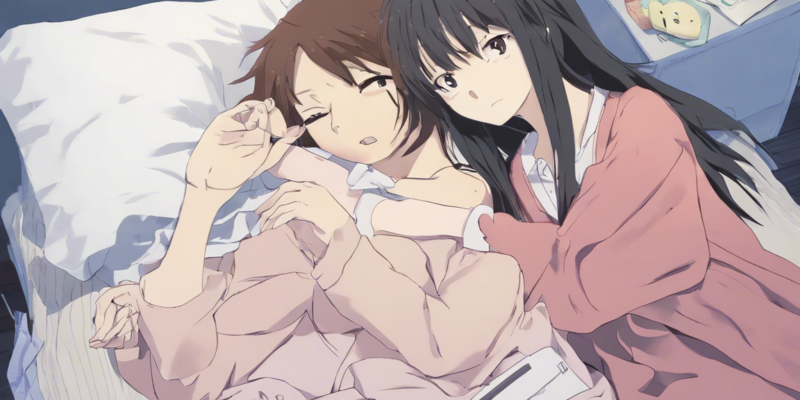Introduction
In the vast world of manga and anime, there are tales that resonate deeply with fans, capturing their hearts and minds with compelling narratives and engaging characters. One such story that has garnered a dedicated following is the enigmatic “Kimi Wa Houkago Insomnia.” This manga series, written and illustrated by Makoto Ojiro, delves into the depths of the human psyche, exploring themes of love, loss, friendship, and the pursuit of one’s dreams. As fans immerse themselves in this captivating world, they uncover layers of emotion and complexity that make “Kimi Wa Houkago Insomnia” a truly unforgettable experience.
Understanding the Plot
At the heart of “Kimi Wa Houkago Insomnia” lies the story of Yuu, a high school student who struggles with insomnia. Unable to sleep at night, Yuu finds solace in the school’s rooftop garden, where he meets Nene, a mysterious girl who shares his nocturnal habits. As their paths intertwine, they form a deep bond that transcends the boundaries of reality and dreams. Together, they navigate the challenges of adolescence, grapple with their inner demons, and confront the uncertainties of the future.
Exploring the Characters
Central to the narrative are the two protagonists, Yuu and Nene, whose contrasting personalities and experiences enrich the story. Yuu is a reserved and introspective young man, haunted by his past and plagued by insomnia. His struggles with self-doubt and loneliness are palpable, drawing readers into his world of unspoken emotions and hidden desires. In contrast, Nene exudes a charismatic and free-spirited energy, masking her own insecurities and vulnerabilities beneath a veneer of cheerfulness. Together, they form a compelling duo that captivates audiences with their raw authenticity and emotional depth.
Themes and Symbolism
“Kimi Wa Houkago Insomnia” delves into a myriad of themes and symbolism that add layers of meaning to the narrative. From the exploration of mental health and identity to the complexities of human relationships and the power of dreams, the manga invites readers to reflect on their own experiences and perceptions of the world. The recurring motif of insomnia serves as a metaphor for the characters’ inner turmoil and emotional struggles, highlighting the fragile balance between reality and illusion.
Artistic Style and Visual Language
Makoto Ojiro’s distinctive artistic style infuses the pages of “Kimi Wa Houkago Insomnia” with a sense of ethereal beauty and emotional depth. The delicate linework, expressive character designs, and evocative use of light and shadow create a mesmerizing visual language that complements the narrative perfectly. The juxtaposition of dreamlike imagery and stark reality adds a surreal quality to the storytelling, blurring the lines between the conscious and subconscious mind.
Critical Acclaim and Fan Reception
Since its debut, “Kimi Wa Houkago Insomnia” has garnered critical acclaim and amassed a dedicated fan base that spans across the globe. The manga’s nuanced storytelling, rich character development, and hauntingly beautiful artwork have earned it praise for its emotional impact and thematic depth. Fans have lauded the series for its poignant exploration of human emotions, its sensitive portrayal of mental health issues, and its ability to evoke a sense of catharsis and empathy.
The Legacy of “Kimi Wa Houkago Insomnia”
As “Kimi Wa Houkago Insomnia” continues to enrapture readers and inspire new generations of fans, its legacy endures as a testament to the power of storytelling and the beauty of human connection. Through its profound exploration of love, loss, and the search for meaning, the manga invites readers to embark on a journey of self-discovery and introspection. In a world filled with uncertainties and challenges, “Kimi Wa Houkago Insomnia” stands as a beacon of hope and inspiration, reminding us of the transformative power of art and imagination.
FAQs (Frequently Asked Questions)
- What genre does “Kimi Wa Houkago Insomnia” belong to?
-
“Kimi Wa Houkago Insomnia” falls under the genres of drama, romance, and psychological fiction, blending elements of fantasy and slice of life.
-
Is the manga suitable for all ages?
-
Due to its mature themes and emotional content, “Kimi Wa Houkago Insomnia” is recommended for older teens and adult readers.
-
Are there any trigger warnings for sensitive topics in the series?
-
The manga addresses themes of mental health, trauma, and loss, so readers are advised to approach the series with caution if these topics may be triggering for them.
-
Does “Kimi Wa Houkago Insomnia” have an anime adaptation?
-
As of now, there is no anime adaptation of “Kimi Wa Houkago Insomnia,” but fans remain hopeful for a future adaptation.
-
Where can readers purchase English translations of the manga?
-
English translations of “Kimi Wa Houkago Insomnia” can be purchased through online retailers, bookstores, and digital platforms that specialize in manga and graphic novels.
-
Is there a definitive ending to the series or is it ongoing?
-
The “Kimi Wa Houkago Insomnia” manga series has a definitive ending, providing closure to the story arcs of the main characters and their journeys.
-
What sets “Kimi Wa Houkago Insomnia” apart from other manga series?
-
The unique blend of psychological depth, emotional resonance, and surreal imagery sets “Kimi Wa Houkago Insomnia” apart, offering readers a distinctive and immersive reading experience.
-
Are there any hidden Easter eggs or symbols in the artwork of the manga?
-
Makoto Ojiro incorporates subtle symbols and imagery throughout the manga, inviting readers to unravel hidden meanings and interpretive layers within the visual storytelling.
-
How has “Kimi Wa Houkago Insomnia” influenced the manga and anime industry?
-
The success of “Kimi Wa Houkago Insomnia” has inspired new trends in storytelling, character development, and thematic exploration within the manga and anime industry, influencing future creators and narratives.
-
What themes or messages can readers take away from “Kimi Wa Houkago Insomnia”?
- Readers can take away themes of resilience, self-acceptance, the power of human connection, and the importance of facing one’s inner demons with courage and compassion from “Kimi Wa Houkago Insomnia.”

